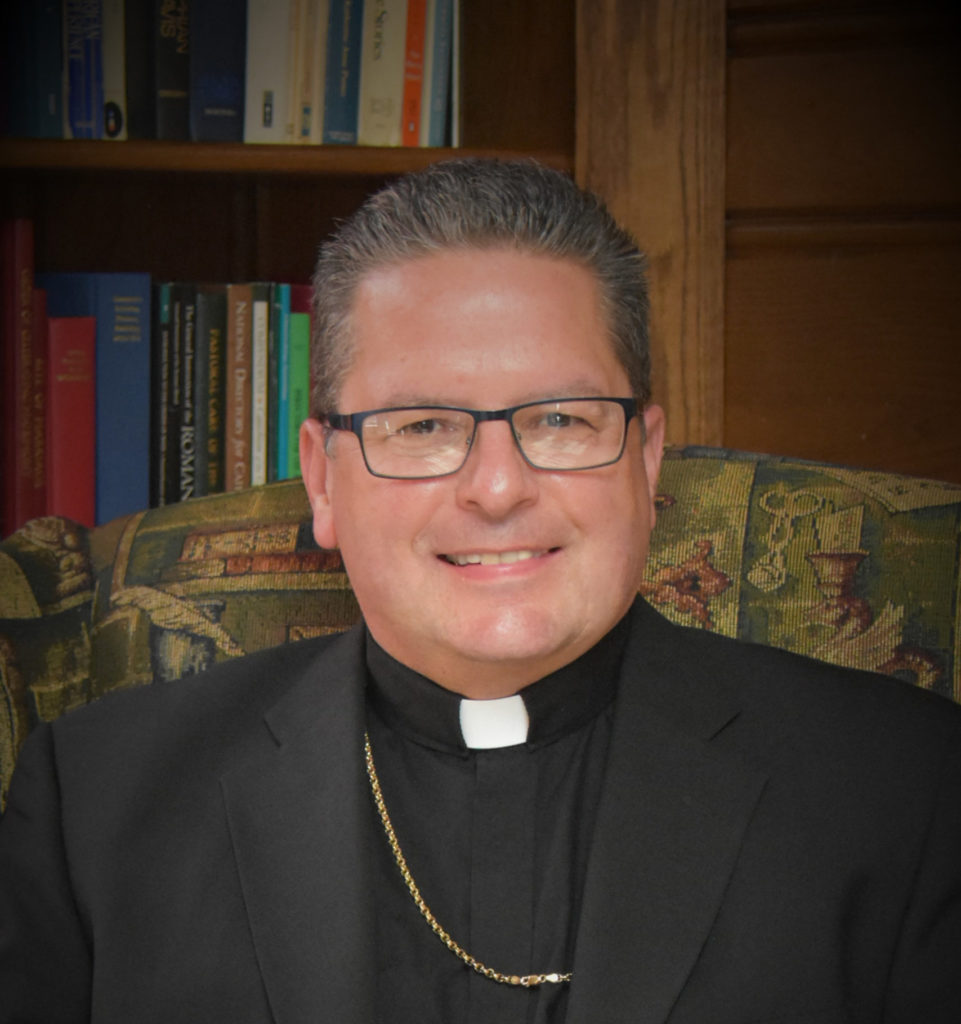WALKING BY FAITH TOGETHER | The Catholic Exponent
MOST REV. DAVID J. BONNAR
Bishop of Youngstown
One of the distinguishing characteristics for any successful leader is vision for a mission. On Jan. 12, 2021, I was ordained and installed as the chief shepherd for the six counties that comprise the Diocese of Youngstown. I brought with me a vision for our faith community illustrated in my Episcopal Motto: “That all may be one” (John 17:21). At a time in which there is so much division and divisiveness in our world, country and Church, I pray that we might realize Jesus’ great priestly prayer for us.
In addition, in my pastoral letter, “Testify to the Light,” I outlined five priorities for us as a diocese – namely, prayer, healing, communication, service and joyful witness. I also embraced Pope Francis’ dream for a missionary Church by appointing a vicar of missionary discipleship.
The term “missionary discipleship” comes from Pope Francis’ 2013 Apostolic Exhortation, “The Joy of the Gospel,” which he wrote as he began his ministry as pope. In that exhortation, the Holy Father writes: “I dream of a ‘missionary option,’ that is, a missionary impulse capable of transforming everything, so that the Church’s customs, ways of doing things, times and schedules, language of today’s world can be suitably channeled for the evangelization of today’s world rather than for her self-preservation” (no. 27). In the same document the Holy Father quotes St. Pope John Paul II, who said: “All renewal in the Church must have mission as its goal if it is not to fall prey to a kind of ecclesial introversion.”
The parish is the expression of the Church. It is the place where we encounter Jesus and grow in faith. In “The Joy of the Gospel,” Pope Francis invites parishes to be mission-oriented and “capable of self-renewal and constant adaptivity” (no. 28). Changing demographics, fewer priests, diminishing financial resources along with the ongoing effects of the pandemic, have put a strain on many parishes. More and more priests are serving multiple parishes. Some parishes have merged while others have closed. These are changing times filled with many pastoral challenges for all.
My late predecessor, Bishop George Murry, S.J., did his best to prepare this local Church for these challenges by inaugurating a consultative pastoral planning process, and promulgating a pastoral plan on June 28, 2019. Shortly after my arrival, I renewed our commitment to this plan. In September of this year, all of us priests gathered in Geneva for our multi-day convocation. The theme for this gathering was “Forward Together.” We discussed the plan and the absolute necessity for collaboration. At the same time, I spoke about the fact that we all need to live in reality. We cannot give what we do not have. Things are not the way they used to be. We cannot fall prey to a nostalgic faith that always looks back. Rather, with courage and trust, we must move forward together in faith and hope.
We are moving forward in faith and hope in parishes throughout our diocese. One of those is Christ the Good Shepherd Parish in Campbell. It is important to highlight here that, since 2012, the faith community in Campbell is “Christ the Good Shepherd Parish.” When parishes are merged, as they were in Campbell, the former parishes officially close and cease to exist as distinct parishes. And so, while the former church buildings continued to exist – St. John the Baptist, St. Joseph the Provider, and St. Lucy/Santa Rosa de Lima – the parish has been “Christ the Good Shepherd” since 2012.
Bishop Murry’s 2019 pastoral plan called for Christ the Good Shepherd and the City of Campbell to have one church building and one weekend Mass. In June of this year, as part of my implementation of the plan, I appointed Father James Korda as special administrator, with the charge to work with the parish’s councils to recommend the church building. After a series of meetings, they made a recommendation, which was then endorsed by the diocese’s Presbyteral Council. As a matter of full disclosure, the recommendation by the parish’s councils was not unanimous, though the endorsement by the Presbyteral Council was. As the local ordinary, it is my responsibility to make such decisions for the good of the faithful, having pursued consultation (Canon 50 of “The Code of Canon Law”). On Sept. 13, 2021, I issued a decree that will close St. Lucy Church and St. Joseph the Provider Church effective Nov. 28. On that date, Christ the Good Shepherd Parish will have one church building on Reed Avenue in Campbell. In order not to contribute to the blight of neighborhoods, the church building of St. Lucy and the campus of St. Joseph the Provider will be sold.
Recently, a small group of former parishioners of St. Lucy, which closed as a parish in 2012, questioned the process and accused the diocese of a lack of transparency as well as neglect. As bishop, I felt it important to gather all of Christ the Good Shepherd’s former administrators to review the pertinent facts. In a letter which I have recently sent to every Christ the Good Shepherd parishioner, I reviewed those details and sought to offer my encouragement to all in that community who are working so hard for parish unity and mission.
As a diocesan Church that lives in communion with one another, it is important to note that the parish has accumulated a large debt of $844,268, which is the result of unpaid property liability insurance and diocesan assessments dating back to 2013. Throughout this time, diocesan offices made efforts to help the parish correct this situation, and continue to do so, but the parish has struggled financially. The fallout from all of this is that, recently, the parish has not been able to pay a pastor or any staff except for a bookkeeper. Quite simply, there is little means for mission. It is our hope that the selling of the two church properties will provide needed income. It is important that the Church not only continue to exist in Campbell, where there is a loyal group of faithful, but we also need to grow the Church and move from a maintenance mode to one motivated by mission – from a focus on buildings to a focus on people.
As bishop, I appreciate the attachment to church buildings where so many special family sacramental moments have occurred. I know the pride that the faithful in that area have for each of those three church buildings, which are maintained by faithful volunteers. And I know so well the grief that comes with the closure of those buildings. Recently, the church building of my first pastorate was closed. I feel your pain.
And yet, the Church is not about buildings, but rather about Jesus and a community that surrounds itself around him. In the Gospel, Jesus says: “Wherever two or three gather in my name, there am I in their midst.” (Matthew 18:20). Jesus says nothing about buildings. It is all about people coming together in Him. And it is not about maintaining the status quo but embracing mission.
In “The Joy of the Gospel,” Pope Francis writes: “More than by fear of going astray, my hope is that we will be moved by the fear of remaining shut up within structures which give us a false sense of security, within rules which make us harsh judges, within habits which make us feel safe, while at our door people are starving and Jesus does not tire of saying to us: ‘Give them something to eat’ (Mark 6:37).
The Church does not exist for herself but for Christ and the world. Recently I attended a conference and heard Cardinal Michael Czerny say this better than I could ever say it. The cardinal, who works for the Vatican’s efforts on behalf of migrants and refugees, essentially said that the Church is not a noun but a verb. Right now, God is calling us to go forth to be the Church. That is our mission.
My dear brothers and sisters, I know that we have a rich past filled with special memories, many of which involve our church buildings. I believe our future can be just as rich if we keep our eyes fixed on Jesus and invest our efforts in becoming missionary disciples. When we pause to look at our tradition, we find that true missionaries let go in faith and leave behind a particular way of life – embracing hope of a better future in service to others. This is not a time for us to be selfish, stubborn or nostalgic. It is a time for us to be courageous, bold and trusting. Let us move forward together in faith, trusting in our loving God, knowing that, for all of us, the best is yet to be.
We can no longer as an institution give false hope to our people or delay in making hard decisions which create more problems for the future. I realize that there are many “Monday morning quarterbacks,” questioning some of the play calls in our pastoral planning process which have never been fully resolved. If anyone has been hurt as a result of decisions or lack thereof, I apologize in the name of the Church. I believe from what I know that everyone did their best. Now, however, it is incumbent on all of us to come together and move on for the good of the Church and be transformed for mission.
We have no choice but to continue onward with the plan, which no doubt will mean that there will be more modifications. As we do so, let us commit ourselves and our parishes to the “self-renewal and constant adaptivity” into which Pope Francis invites us. With changes come many graces and opportunities for us to proclaim the Gospel of Joy in new and fresh ways. This is all part of God’s plan to renew the Church and to call us to be one.


